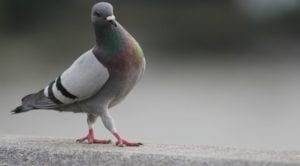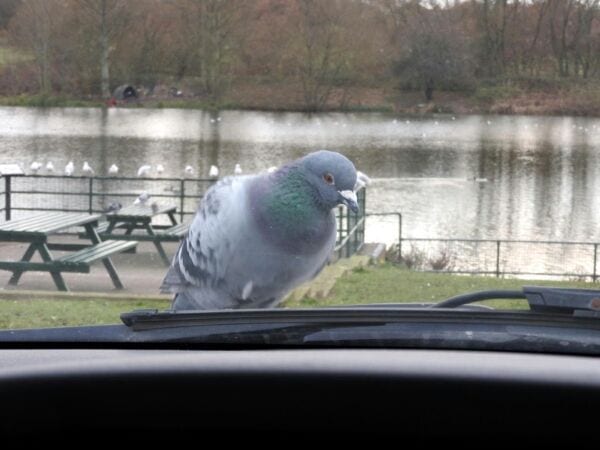
by Pigeon Patrol | May 30, 2023 | history of pigeons, MBCA, pet bird, Pigeon Control, Pigeon Droppings, Pigeon Patrol's Services, Pigeon Predators
In the span of a few weeks, Erica Richards has been transformed from a vibrant 23-year-old woman who loved nature to a person battling for her life.
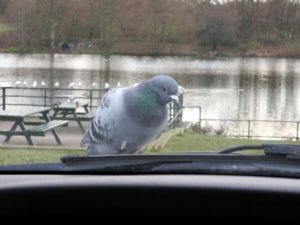
In early January, the Fredericton woman contracted a potentially fatal condition called cryptococcal meningitis, a fungal disease carried in the feces of pigeons.
The debilitating illness attacks the spine and brain, causing severe swelling. It left her confined to a hospital bed in a state of delirium for weeks.
But the most devastating side effect is that Ms. Richards is now blind.
“Be aware of this disease. It could kill a child in a heartbeat,” Ms. Richards said in an interview from her hospital bed.
“It could kill a senior in a heartbeat without you even having to worry about the symptoms. It comes on that fast. If you don’t realize the symptoms, it could kill you, too.”
Her emotional warning comes on the heels of city council’s approval earlier this month of a recommendation that it toughen its animal control bylaw to allow for fines for feeding pigeons. Once the amendment is drafted and declared law, it will give the city’s bylaw enforcement officers the power to ticket and fine offenders.
Ms. Richards said she decided to go public about her illness after learning about a recent newspaper story about a problem with pigeon poop in the city.
“Please don’t feed the pigeons,” she said. “Try to shoo them away if you see them. … It (the disease) is horrible. The pain that you get from this disease is crippling.
“The after-effects are with you for life and you just can’t stop thinking about it. I just want other people to know and try to stay away from pigeons.”
Oddly enough, Ms. Richards said she has no recollection of ever being anywhere near pigeons.
“I am still wondering to this day where I got it,” she said. “I could have stepped in it and brought it into the home. I just don’t know.”
Ms. Richards said the symptoms started with a migraine headache that wouldn’t go away. She was admitted to hospital on Feb. 10 after many days of intense head pain. Shortly after, she went into a coma-like state.
“When I woke up I thought I had a mask over my eyes, but I was wrong. I was blind. I was recently told that I will be blind for the rest of my life. This is a tough thing for a 23-year-old to go through. … My world crumbled around me.”
Ms. Richards said the odds of surviving the disease are 50-50.
“However, I managed to make it through,” she said, battling tears. “I don’t know how but I am still here, and I am glad because I get to warn everyone else of this.”
Cristin Muecke, the Health Department’s regional medical officer, confirmed the disease is often associated with pigeon droppings. She said the illness can’t be spread person to person and is more common with someone who has immune problems.
Ms. Richards, however, said she has never had a problem with her immune system and that’s what’s so puzzling about contracting the affliction.
“I do not want anyone else to suffer this agonizing disease and I ask anyone who is feeding pigeons to stop,” she said. “It’s not just a matter of keeping your neighbourhood clean … it’s a matter of keeping people healthy.”
Source
Pigeon Patrol Products & Services is the leading manufacturer and distributor or bird deterrent (control) products in Canada. Pigeon Patrol products have solved pest bird problems in industrial, commercial, and residential settings since 2000, by using safe and humane bird
deterrents with only bird and animal friendly solutions. At Pigeon Patrol, we manufacture and offer a variety of bird deterrents, ranging from Ultra-flex Bird Spikes with UV protection, Bird Netting, 4-S Bird Gel and the best Ultrasonic and audible sound devices on the market today.
Voted Best Canadian wholesaler for Bird Deterrent products ten years in a row.
Contact us at 1 877-4-NO-BIRD,(604) 585-9279 or visit our website at www.pigeonpatrol.ca
Pigeon/Pigeon Patrol / Pigeons Roosing / Vancouver Pigeon Control / Bird Spikes / Bird Control / Bird Deterrent / PIgeon Deterrent / Surrey Pigeon Control / Pest / Seagull deterrent / Vancouver Pigeon Blog / Birds Inside Home / Pigeons in the cities / Ice Pigeons / What to do about pigeons / sparrows, Damage by Sparrows, How to Keep Raccoons Away, Why Are Raccoons Considered Pests / De-fence / Pigeon Nesting / Bird Droppings / Pigeon Dropping / woodpecker control / Professional Bird Control Company / Keep The Birds Away / Birds/rats/seagull/pigeon/woodpecker/dove/sparrow/pidgeon control/pidgeon problem/pidgeon control/flying rats/pigeon problems/ bird netting/bird gel/bird spray/bird nails/bird guard
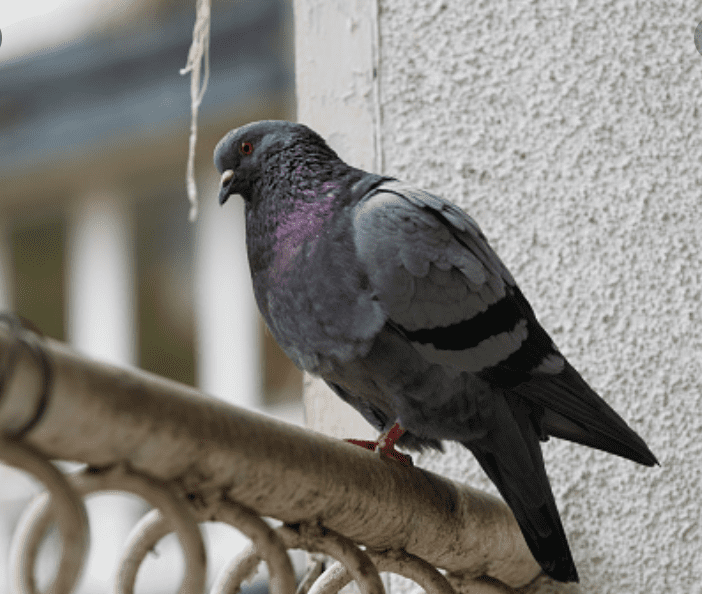
by Pigeon Patrol | May 30, 2023 | Bird Spike, Pigeon Droppings, Pigeon Patrol's Services, Pigeon Predators, Pigeon Spikes, Pigeons, Pigeons in the News
Some people enjoy spending time around pigeons in parks or sidewalks and feeding them seeds or bread crumbs, while others see pigeons as pests that harbor dangerous diseases. No matter whether you love pigeons or hate them, they do spread diseases that can infect humans. Psittacosis is one of these diseases. Occasionally being around pigeons is unlikely to lead to infection. But certain circumstances surrounding homes and businesses can put people at risk of becoming infected. So it’s important to learn about the symptoms and how pigeons spread psittacosis.
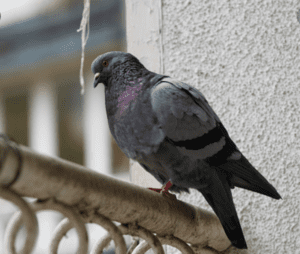
What Is Psittacosis?
Psittacosis is a respiratory illness that humans obtain from a type of bacteria (Chlamydia psittaci ) shed by birds. Sometimes called parrot fever or ornithosis, the disease can affect many different species of birds. Infected birds can become very sick or show no symptoms at all, making it difficult to know if surrounding people are at risk. Whether birds have symptoms or not, they can still pass the disease to people and other mammals.
Infected birds with and without symptoms shed the bacteria in respiratory secretions and droppings. When these secretions and droppings dry, they form dust that spreads through the air and can be inhaled into human respiratory systems. People get the disease by breathing in dried dust particles — that’s how pigeons spread psittacosis. However, it can be spread through bites or beak-to-mouth contact.
People of any age can contract psittacosis, but it’s most common among bird owners or people who work in bird-related occupations. However, psittacosis in pigeons can present additional points of infection. The illness has a rapid transmission rate among birds and thrives in overcrowded areas, like roosting spaces and nests. So it’s likely that massive flock outbreaks occur among pigeons.
Psittacosis Symptoms
Most often, psittacosis symptoms are similar to flu symptoms. However, symptoms can become severe and include pneumonia. If you suspect you’ve been infected with psittacosis, it’s necessary to seek medical attention since antibiotic treatment is required. Symptoms may include:
- • Dry cough
- • Fever
- • Chills
- • Headache
- • Muscle aches
- • Nausea/vomiting
- • Sore throat
- • Difficulty breathing in severe cases
- • Chest pain in severe cases
- • Pneumonia in severe cases
- • Nosebleeds in severe cases
- • Swelling of organs in severe cases
Treatment
Psittacosis is considered rare in humans since only 50 to 200 cases each year are reported. However, many researchers think the illness is under-reported; the symptoms mimic common illnesses like the flu, and the point of infection often goes unnoticed. Severe cases of psittacosis require medical treatment for recovery. Antibiotic therapy is the primary treatment for individuals with psittacosis (typically tetracycline or doxycycline).
How Pigeons Spread Psittacosis
While people also call psittacosis ‘parrot disease,’ any bird susceptible to the bacteria can spread infection. Since pigeons travel and roost in large flocks, it’s likely that the disease spreads readily among pigeons in crowded areas. Sick birds can exhibit symptoms like red, watery eyes, nasal discharge, lethargy, ruffled feathers, diarrhea, and a poor appetite. Alternatively, they can exhibit no symptoms at all. It’s suspected that pigeons have genetic resistance that makes them more likely to show no symptoms and, consequently, become carriers.
In many cities, workspaces, and areas around homes, pigeons roost in large groups and leave piles of feces that must be cleaned away regularly. These areas create potential infection points for people. Once you know how pigeons spread psittacosis, you can focus on maintenance tasks that minimize the risks.
Psittacosis Dangers for Homeowners
Pigeons are common in both urban and rural areas. Unfortunately, when they decide to infest the space around your home, you might find them roosting over your patio, on your children’s play equipment, or even in your attic. If you have pigeons roosting around your home, they leave piles of droppings anywhere they flock. After what you’ve learned about how pigeons spread psittacosis, imagine sweeping piles of dried droppings from your patio — or worse, your attic. When pigeons spend their nights or evenings on playhouses or swing sets, they put your children at risk of getting psittacosis when they go outside to play.
Short of avoiding the spaces you enjoy outdoors, it’s nearly impossible to completely eliminate the risk of psittacoses exposure when you have a pigeon infestation. The solution is deterrence. Visual bird deterrents include lights, holographic devices, and decoy owls or other decoy predators that can be used to frighten pigeons away from your home and yard. Audio bird deterrents work best for residences without pets. They use distress calls and frightening noise to scare birds away.
Psittacosis in Commercial Settings
Commercial properties are even more likely than homes to attract flocking pigeons. If you’ve dealt with pigeons at your business property, you know all the spaces where they leave piles of droppings (and the damage they can cause). As a business owner, you know bird droppings and the health risks of psittacosis present a variety of worries. Droppings on storefronts, trash cans, streetlights, sidewalks, parking lots, railings, and any of the other places pigeons roost have the potential to endanger your customers and employees, as well as your own health. Even worse, when pigeons get inside your commercial building, they can pose additional threats by accessing your storage.
As a business owner, you have a responsibility to keep your landscape and business clean. But cleaning away bird droppings can present risks. OSHA recommends precautions to protect workers from contracting the disease through inhalation. However, deterrence can help you avoid all the problems associated with pigeons and their effect on commercial spaces. While visual and audio deterrents are useful in commercial settings, other measures might also be required. Bird spikes and optical gel are both popular solutions for deterring pigeons in commercial spaces.
Learning about how pigeons spread psittacosis and the dangers caused by pigeon droppings can help you understand the disease’s symptoms and ways you can avoid infection. Safely and humanely deterring pigeon flocks is the best way to avoid dangers from their droppings and the damage they cause around your home or business. To learn more about psittacosis and other diseases that can be spread in pigeon droppings, get in touch with our bird control experts.
Source
Pigeon Patrol Products & Services is the leading manufacturer and distributor or bird deterrent (control) products in Canada. Pigeon Patrol products have solved pest bird problems in industrial, commercial, and residential settings since 2000, by using safe and humane bird
deterrents with only bird and animal friendly solutions. At Pigeon Patrol, we manufacture and offer a variety of bird deterrents, ranging from Ultra-flex Bird Spikes with UV protection, Bird Netting, 4-S Bird Gel and the best Ultrasonic and audible sound devices on the market today.
Voted Best Canadian wholesaler for Bird Deterrent products ten years in a row.
Contact us at 1 877-4-NO-BIRD,(604) 585-9279 or visit our website at www.pigeonpatrol.ca
Pigeon/Pigeon Patrol / Pigeons Roosing / Vancouver Pigeon Control / Bird Spikes / Bird Control / Bird Deterrent / PIgeon Deterrent / Surrey Pigeon Control / Pest / Seagull deterrent / Vancouver Pigeon Blog / Birds Inside Home / Pigeons in the cities / Ice Pigeons / What to do about pigeons / sparrows, Damage by Sparrows, How to Keep Raccoons Away, Why Are Raccoons Considered Pests / De-fence / Pigeon Nesting / Bird Droppings / Pigeon Dropping / woodpecker control / Professional Bird Control Company / Keep The Birds Away / Birds/rats/seagull/pigeon/woodpecker/dove/sparrow/pidgeon control/pidgeon problem/pidgeon control/flying rats/pigeon problems/ bird netting/bird gel/bird spray/bird nails/bird guard
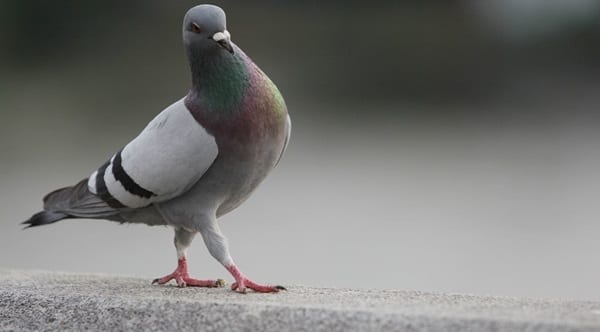
by Pigeon Patrol | May 30, 2023 | Bird Spike, Pigeon Predators, Pigeon Spikes, Pigeons, Pigeons in the News, Raccoons, Sparrows, UltraSonic Bird Control
The simple truth is the danger varies depending on the specific infestation. However, if you have a pigeon infestation of any size on your home or property, there is a real risk of contracting an illness from their droppings. The safe bet is to deal with your pigeon infestation as soon as possible to remove any risk of illness.
Pigeons can contract and carry many diseases and parasites which do end up in their droppings. When pigeons find a place on your roof or property to call home, they will quickly create a large mess of their own poop.
Typically at least one of two things are going to eventually happen with pigeons living on your property:
1. Pigeons will poop on your roof and mother nature will make sure that waste ends up on the ground, or in your bushes, trees, and plants. This has the danger of possibly getting tracked into your home by you, your family and even pets. This will cause any disease or even parasites in those droppings to end up right in your home.
2. The pigeons will find a comfortable place to nest and usually will just poop in one place. Those droppings will pile up on your roof or a ledge and will cause direct property damage. Droppings are very acidic and can destroy roofing materials and even damage solar panels. If you get a roof leak, rainwater can soak the droppings causing even more property damage. That tainted water will bring everything in their droppings right into your attic and anywhere the leak travels.
Disease or not, I think can we agree that having a bunch of bird poop on your property is just plain gross!
Speaking of diseases and parasites caused by pigeons, here’s the most common ones you should be concerned with…
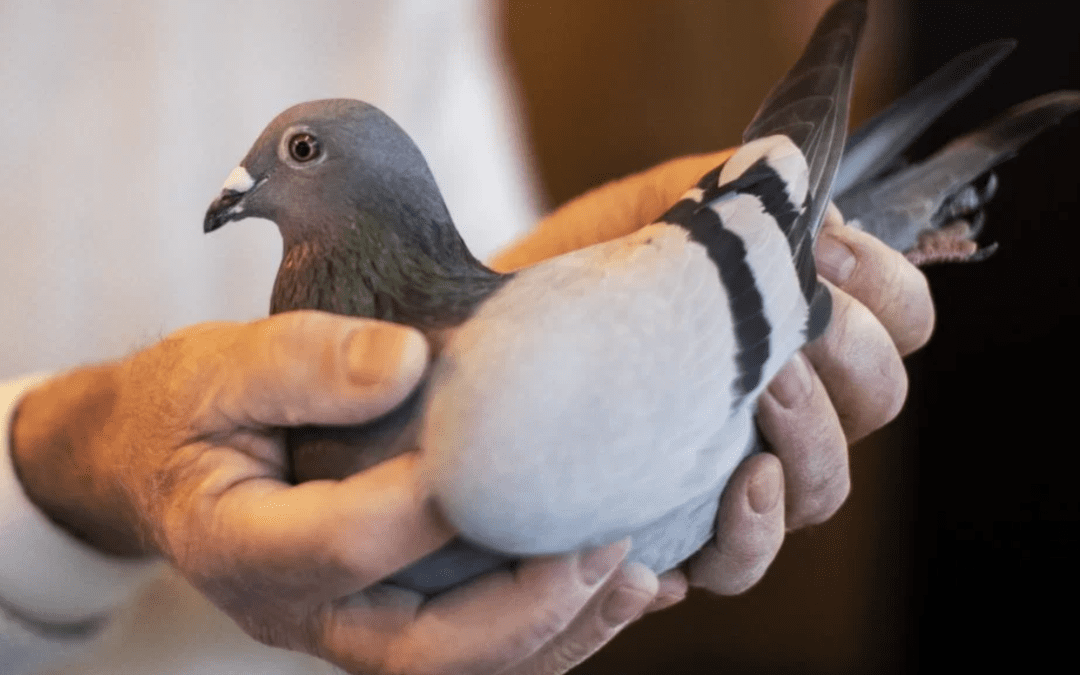
by Pigeon Patrol | May 23, 2023 | Bird Spike, Pigeon Predators, Pigeon Spikes, Pigeons, Pigeons in the News, Raccoons, Sparrows, UltraSonic Bird Control
Animals can be entertaining and educational. But children, especially children under 5 years of age, are more likely to get sick from germs animals can sometimes carry. Children can learn a lot from animals, and it’s important to make sure they stay safe and healthy while they’re learning. If you plan to have an animal in your classroom, whether it’s a class pet or for a hands-on learning experience, be aware of the risks and how to prevent illness. You can help kids enjoy and learn from animals while staying healthy.
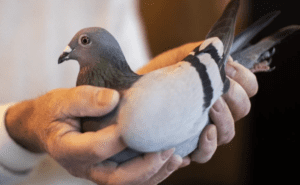
Animals can sometimes spread germs
Animals can sometimes carry germs that can make people sick, even if they look clean and healthy. You don’t have to touch an animal to get sick – the germs can spread to cages, bedding, and wherever animals roam.
There have been disease outbreaks from hatching eggs and chicks in the classroom and from contaminated animal products used for hands-on learning, such as owl pellets for dissection. Salmonella and E. coli are common germs spread by animals.
How to prevent germs from spreading in the classroom
- Do not bring reptiles, amphibians, poultry, rodents, or ferrets into schools, daycare centers, or other settings with children under 5 years of age.
- Adults should always supervise children’s contact with animals. Never allow children to put their hands or objects (including pacifiers) in their mouth while around animals.
- Create specific areas for interaction with animals. Do not allow animals to roam freely around the classroom, especially in areas where food or drink is prepared, served, or eaten.
- Do not dissect animals or other animal products where food for people is prepared, served, or eaten. Thoroughly clean and disinfect surfaces used for dissection.
- Consult with parents to determine special considerations for children who have allergies, asthma, or other illnesses.
- Students should wash their hands with water and soap right after handling animals, their food, or their habitats (for example, cages, terrariums, aquariums, water bowls, and toys).
- When around animals, also wash hands after removing dirty clothes or shoes, before eating and drinking, and before preparing food or drinks.
- Adults, including teachers, should always supervise handwashing for young children.
- Use hand sanitizer if running water and soap are not available. If you only use hand sanitizer, be sure to wash your hands with soap and water as soon as possible.
- Clean and disinfect all areas where animals have been.
- Do not clean tanks, feeders, water containers, and other equipment in sinks or areas where food is prepared, served, or eaten.
Check that animals are healthy before bringing them into school
- Animals can look clean and healthy and still spread germs. Make sure all animals have appropriate and regular veterinary care, and proof of rabies vaccination for dogs and cats, according to local or state requirements.
- If the animal comes from a different state or country, it may need a health certificateexternal icon issued by a veterinarian to travel across state lines or to enter the United States.
- Check local regulations, as well as school policies, before bringing animals into schools.
- If the animal becomes sick or dies:
- Contact your veterinarian.
- Take extra precaution when handling a sick animal because a sick or stressed animal is more likely be shedding harmful germs that can make people sick or to bite which can cause injury or spread germs.
- Inform the pet store or breeder about the animal’s illness or death as soon as possible. Consider waiting before purchasing another pet from the same source.
- Clean and disinfect the cage before reusing with another animal.
- If the animal bites someone:
- Wash wounds with warm soapy water immediately.
- Seek medical attention if:
- The animal appears sick.
- You don’t know if the animal has been vaccinated against rabies.
- The wound is serious.
- The wound becomes red, painful, warm or swollen.
- It has been more than 5 years since your last tetanus shot.
Source
Pigeon Patrol Products & Services is the leading manufacturer and distributor or bird deterrent (control) products in Canada. Pigeon Patrol products have solved pest bird problems in industrial, commercial, and residential settings since 2000, by using safe and humane bird
deterrents with only bird and animal friendly solutions. At Pigeon Patrol, we manufacture and offer a variety of bird deterrents, ranging from Ultra-flex Bird Spikes with UV protection, Bird Netting, 4-S Bird Gel and the best Ultrasonic and audible sound devices on the market today.
Voted Best Canadian wholesaler for Bird Deterrent products ten years in a row.
Contact us at 1 877-4-NO-BIRD,(604) 585-9279 or visit our website at www.pigeonpatrol.ca
Pigeon/Pigeon Patrol / Pigeons Roosing / Vancouver Pigeon Control / Bird Spikes / Bird Control / Bird Deterrent / PIgeon Deterrent / Surrey Pigeon Control / Pest / Seagull deterrent / Vancouver Pigeon Blog / Birds Inside Home / Pigeons in the cities / Ice Pigeons / What to do about pigeons / sparrows, Damage by Sparrows, How to Keep Raccoons Away, Why Are Raccoons Considered Pests / De-fence / Pigeon Nesting / Bird Droppings / Pigeon Dropping / woodpecker control / Professional Bird Control Company / Keep The Birds Away / Birds/rats/seagull/pigeon/woodpecker/dove/sparrow/pidgeon control/pidgeon problem/pidgeon control/flying rats/pigeon problems/ bird netting/bird gel/bird spray/bird nails/bird guard
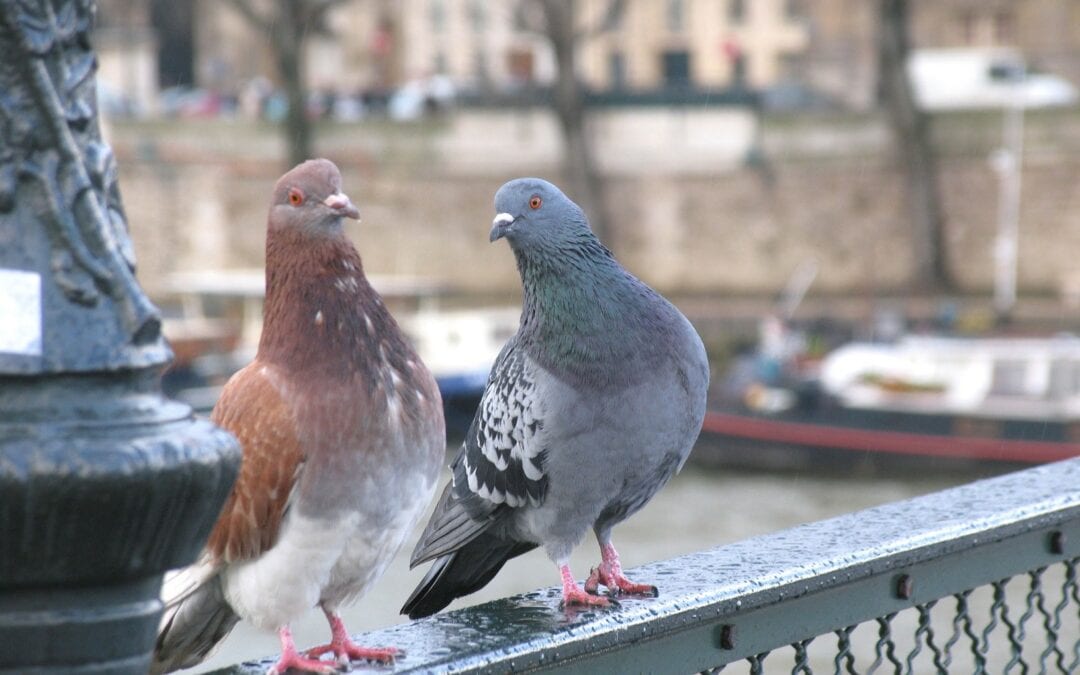
by Pigeon Patrol | May 23, 2023 | Bird Spike, Pigeon Predators, Pigeon Spikes, Pigeons, Pigeons in the News, Raccoons, Sparrows, UltraSonic Bird Control
If you are a pet bird lover or taking your baby to a house with bird pets and wondering if it’s healthy or unsafe for your child, then here is what you must know about the safety of the babies when they are around birds.
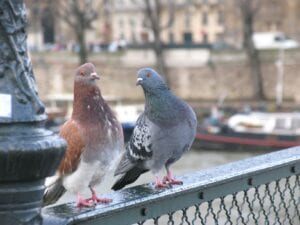
The Basics about the Problem with Birds and Babies
The birds like gulls and pigeons are categorized as pests as they spread diseases through the dust and their feathers. Pregnant women and babies are prohibited to come in contact with the birds like pigeons, gulls and parrots as they can cause sickness. Also, the transmission of some diseases from a few birds occurs through direct contact, inhaling, food contamination and some other ways.
Is Bird Dropping Toxic to Babies?
Well the below-mentioned diseases will explain everything.
Some of the Common Birds Related Diseases
Psittacosis (Parrot Fever)
Parrot fever, parrot infection or Psittacosis which is a disease related to newborn baby and parrot occurs due to bacteria called Chlamydia Psittaci. The name may point towards parrots but there are other birds too that spread parrot fever including pigeon, duck and chicken. The primary symptoms of this disease resemble that of flu. Victims may experience fever, dry and non-productive cough. Nausea, vomiting, muscle pain, diarrhea, tiredness and fatigue are some other symptoms that indicate that a person is suffering from parrot fever.
Parrot disease mainly spreads to human and people with poor immunity, elderly people, babies and pregnant women are highly prone to this disease. Also, people with respiratory issues easily get sick due to Parrot disease. Dust, feathers and cried bird droppings are the main factors that encourage the spreading of this disease.
So, if you are sick and you got birds at home then immediately consult with your doctor or health practitioner and mention that you have parrot or other pet birds at home. Doctors usually prescribe antibiotics for the treatment of parrot disease but it’s important to take precautions when you have kids at home as their immunity is comparatively weaker than the adults and they are highly prone to this disease. Make sure your baby washes his/her hands after touching the bird, the cage or the feather/droppings.
Allergic Alveolitis
Allergic Alveolitis which is commonly known as Hypersensitivity Pneumonitis is basically a lung infection where the lung is inflamed. This occurs due to the exposure to bird droppings, dust and feathers. This can also occur in the outer part of the body. Repeated exposure to these bird residues that contain fungi and bacteria causes a reaction in the body’s defence system making you sick.
Ref: https://www.sciencedirect.com/science/article/pii/B9781455733835000646
Salmonella
Salmonella infections that are commonly known as Salmonellosis spread through the feces and feathers of the birds. This infection mainly affects the intestinal tract. The symptoms of this diarrheal sickness include diarrhea, chills, fever, vomiting and abdominal cramps.
Ref: https://meridianbirdremoval.com/why-birds-cause-salmonellosis-risk/
Mycobacterium Avian Complex (MAC):
MAC usually affects people with a poor immune system. This disease is mainly caused by the organisms called M Intracellulare and M Avium. The results of this disease can be fatal sometimes.
Diseases caused by pigeons
If you see pigeons around your home and you got kids then you need to be a bit concerned about them. The common troubles faced due to pigeons are their droppings, feathers and dust spreading in the balcony. Pigeon droppings contain fungus and it affects the lungs. Make sure your laundry, especially kid’s laundry is safe is not exposed to the dust and droppings caused by the pigeons. People who have pet birds or simply pests around them generally ask a question – can my bird make pregnant women sick? Yes, they can. Prevent your baby and pregnant woman, if there is any, from getting in contact with the debris, feathers and droppings caused by the pigeons. Educate them about these birds and the health issues caused due to them.
Bird Dropping: Toxic for Humans
Bird droppings are very dangerous to human health. Here are some major hazards due to bird droppings:
E.Coli
This infection occurs due to the enteric bacteria. It is usually found in bird feces.
Candidiasis
This fungal infection is usually caused due to pigeon droppings and affects many organs like intestine, skin, mouth, respiratory system and urogenital tract.
St. Louis Encephalitis
It is a neurological disorder which may end up taking the form of paralysis.
Histoplasmosis
This lethal disease is caused due to the fungus present in bird droppings.
Salmonellosis
This disease is usually experienced when the dust and bacteria come in contact with the food through ventilation or air condition and leads to food poisoning.
The beautiful colors, enchanting sounds and humorous behaviours of birds are always adorable. There is no dearth of pet lovers and kids always fall into this vast category.
BUT, the immune system of the kids are weak and they are very vulnerable to dust and bacteria. If birds are around, dust and droppings will be a common sight but you can take measures to prevent your kids from getting exposed to these things to avoid serious illnesses.
Source
Pigeon Patrol Products & Services is the leading manufacturer and distributor or bird deterrent (control) products in Canada. Pigeon Patrol products have solved pest bird problems in industrial, commercial, and residential settings since 2000, by using safe and humane bird
deterrents with only bird and animal friendly solutions. At Pigeon Patrol, we manufacture and offer a variety of bird deterrents, ranging from Ultra-flex Bird Spikes with UV protection, Bird Netting, 4-S Bird Gel and the best Ultrasonic and audible sound devices on the market today.
Voted Best Canadian wholesaler for Bird Deterrent products ten years in a row.
Contact us at 1 877-4-NO-BIRD,(604) 585-9279 or visit our website at www.pigeonpatrol.ca
Pigeon/Pigeon Patrol / Pigeons Roosing / Vancouver Pigeon Control / Bird Spikes / Bird Control / Bird Deterrent / PIgeon Deterrent / Surrey Pigeon Control / Pest / Seagull deterrent / Vancouver Pigeon Blog / Birds Inside Home / Pigeons in the cities / Ice Pigeons / What to do about pigeons / sparrows, Damage by Sparrows, How to Keep Raccoons Away, Why Are Raccoons Considered Pests / De-fence / Pigeon Nesting / Bird Droppings / Pigeon Dropping / woodpecker control / Professional Bird Control Company / Keep The Birds Away / Birds/rats/seagull/pigeon/woodpecker/dove/sparrow/pidgeon control/pidgeon problem/pidgeon control/flying rats/pigeon problems/ bird netting/bird gel/bird spray/bird nails/bird guard
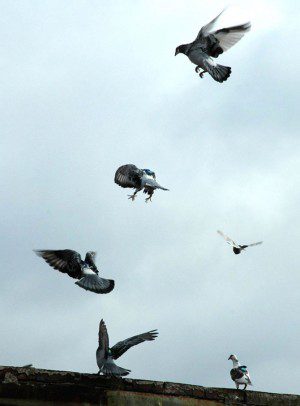
by Pigeon Patrol | May 23, 2023 | Bird Spike, Pigeon Droppings, Pigeon Patrol's Services, Pigeon Predators, Pigeon Spikes, Pigeons, Pigeons in the News
Pigeons are always on the lookout for a source of food and buildings with plenty of high nooks and crannies to roost and nest in, and your factory might just fit the bill.
But if pigeons get into your factory, it’s a serious problem. These pest birds and their guano (poo) carry and spread some nasty diseases, and they can also damage property. This is bad news for any business, but if food is manufactured, packaged, and stored in your factory, it can be disastrous.
Before your reputation and your profits take a serious hit, read our advice on how you can keep pigeons out of your factory.
How to prevent pigeons from getting into your factory
First, eliminate any sources of food
Any sources of food will be very attractive to pigeons, and eliminating them will make your factory less desirable to roost or nest in. Keep your factory scrupulously clean and don’t leave food ingredients or waste lying around, inside or outside of the premises.
It’s also a good idea to talk to nearby businesses if their poor waste management or housekeeping practices are attracting pest birds to the vicinity.
Second, use deterrents
When you are trying to prevent pigeons from nesting or roosting in or on your property, deterrents like bird spikes, bird wire, and netting can be effective at keeping them at bay.
Third, fix up your factory
If there are holes in your factory roof or walls that you haven’t got around to fixing, you could inadvertently be providing pigeons with the perfect nesting place. Make sure you fix them up-deterring pigeons is all about making your factory much less attractive to them.
Finally, deal with the guano
As we mentioned earlier, pigeon droppings can contain some harmful bacteria, so we would recommend that you don’t try to clean it up yourself.
If pest pigeons have made a mess of your factory, call in the professionals. We will blast away guano with the right equipment and products so your premises is clean, safe, and hygienic again.
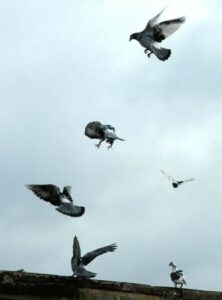
Do I need professional pigeon control for my factory?
As birds are protected by the Wildlife and Countryside Act 1981, it’s illegal to poison or shoot them if you don’t have a license. If you put poison down, you could harm other birds and end up in legal trouble. And not only that, if you’re a food business, you won’t be able to use toxic bird control methods anyway as you could contaminate your product.
If you hire professional pest control, you can get your pest problem dealt with fast. We can deal with any existing infestation, install effective bird-proofing and deterrents, and give you expert advice on preventing any problems in the future.
Source
Pigeon Patrol Products & Services is the leading manufacturer and distributor or bird deterrent (control) products in Canada. Pigeon Patrol products have solved pest bird problems in industrial, commercial, and residential settings since 2000, by using safe and humane bird
deterrents with only bird and animal friendly solutions. At Pigeon Patrol, we manufacture and offer a variety of bird deterrents, ranging from Ultra-flex Bird Spikes with UV protection, Bird Netting, 4-S Bird Gel and the best Ultrasonic and audible sound devices on the market today.
Voted Best Canadian wholesaler for Bird Deterrent products ten years in a row.
Contact us at 1 877-4-NO-BIRD,(604) 585-9279 or visit our website at www.pigeonpatrol.ca
Pigeon/Pigeon Patrol / Pigeons Roosing / Vancouver Pigeon Control / Bird Spikes / Bird Control / Bird Deterrent / PIgeon Deterrent / Surrey Pigeon Control / Pest / Seagull deterrent / Vancouver Pigeon Blog / Birds Inside Home / Pigeons in the cities / Ice Pigeons / What to do about pigeons / sparrows, Damage by Sparrows, How to Keep Raccoons Away, Why Are Raccoons Considered Pests / De-fence / Pigeon Nesting / Bird Droppings / Pigeon Dropping / woodpecker control / Professional Bird Control Company / Keep The Birds Away / Birds/rats/seagull/pigeon/woodpecker/dove/sparrow/pidgeon control/pidgeon problem/pidgeon control/flying rats/pigeon problems/ bird netting/bird gel/bird spray/bird nails/bird guard






